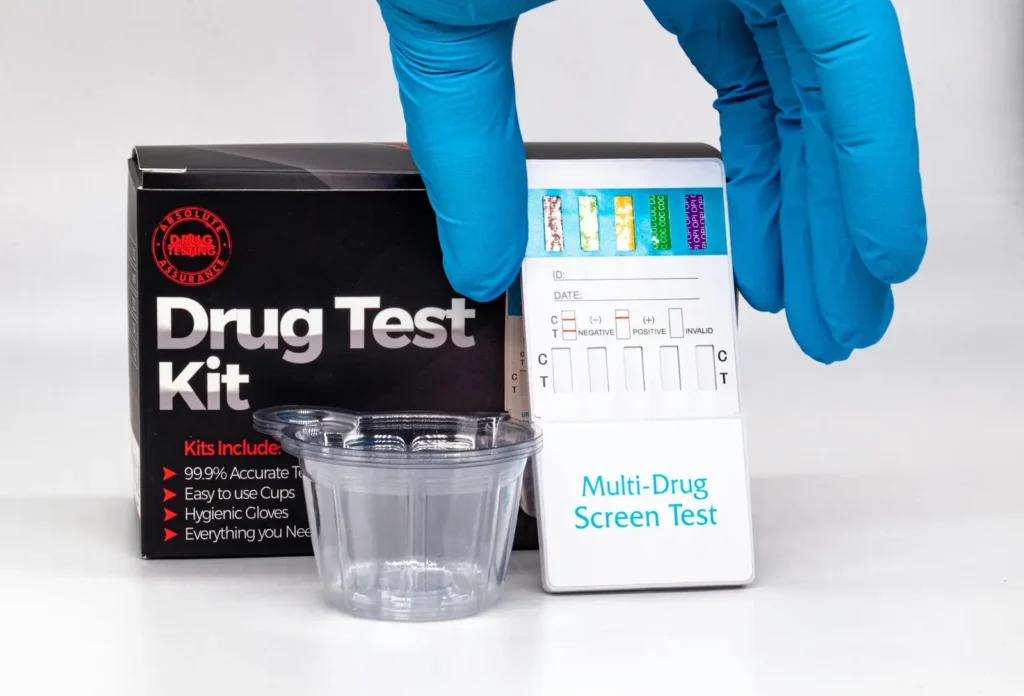Klonopin (clonazepam) is a drug in the benzodiazepine class that’s prescribed to treat anxiety, panic disorders, and certain types of seizures. It’s a longer-acting benzodiazepine and has a half-life of 30-40 hours. Klonopin can stay in your system for up to 6 to 9 days. Klonopin can interact with many drugs and may show up on drug tests, so it’s important to understand how long it stays in your system.
What Is Klonopin?
Klonopin is a brand-name medication for clonazepam, an anxiolytic drug in the benzodiazepine class of drugs. It’s commonly prescribed to treat anxiety disorders, panic disorders, and seizure disorders and works by increasing the presence of the neurotransmitter gamma-aminobutyric acid (GABA), producing feelings of calm and relaxation.[1]
Drugs like Klonopin can help treat the symptoms of anxiety and seizures, but it has a potential for misuse or abuse. Some people may misuse Klonopin to get euphoria or to enhance the effects of other drugs, but doing so can significantly increase the risk of addiction and overdose.
Klonopin Effects
As a prescription drug for anxiety and other conditions, Klonopin calms brain activity to reduce feelings of anxiety and panic or reduce seizure activity.
Klonopin has some side effects, however, including:[2]
- Depression
- Dizziness
- Irritability
- Tiredness
- Poor coordination
- Poor concentration
- Low attention span
- Poor memory
- Nausea
- Loss of appetite
Some serious side effects can occur with Klonopin, including:[3]
- Increased heart rate
- Low blood pressure
- Respiratory depression (slow breathing)
- Difficulty breathing
- Drowsiness
- Impaired speaking
- Loss of pleasure
- Loss of consciousness
- Suicidal thoughts or actions
Klonopin Drug Interactions
Klonopin can have serious drug interactions, including ketoconazole, nefazodone, itraconazole, cimetidine, and fluvoxamine, which can increase the levels of Klonopin in the blood.[4] Combining Klonopin with phenytoin, phenobarbital, and carbamazepine may decrease the levels of Klonopin, reducing its effectiveness.[5]
Combining Klonopin with other benzodiazepines and central nervous system (CNS) depressants, such as alcohol and opioids, can cause dangerous levels of sedation and respiratory depression that may lead to unconsciousness, coma, or death.
Klonopin can cause overdose on its own if you take too much or too frequent doses, but combining Klonopin with other drugs – particularly depressants like alcohol or opioids – can significantly increase the risks.
The signs and symptoms of a Klonopin overdose may include:[6]
- Confusion
- Extreme drowsiness
- Poor reflexes and coordination
- Slurred speech
- Respiratory depression
- Low blood pressure
- Low heart rate
- Cardiac arrest
- Coma
If you or someone you know is experiencing an overdose, call 911. A Klonopin overdose is a medical emergency. Wait with the person until help arrives. The emergency medical team may administer flumazenil, which can partially or completely reverse the effects of a Klonopin overdose. Flumazenil can cause seizures in some people, however.
How Long Does Klonopin Stay in the Body?

Klonopin is a longer-acting benzodiazepine with a half-life of 30 to 40 hours.[7] The primary metabolite, 7-amino-clonazepam, is excreted in the urine, so it stays in the body for a longer period than other drugs with shorter half-lives.
A drug’s half-life is the time it takes for half of a dose of a drug to leave the body. Klonopin can take one or two days for 50% of the drug to be eliminated by the body. On average, it takes about 5 half-lives for a drug to leave the body completely. Therefore, Klonopin can stay in the body for 6 to 9 days.
Klonopin can show up on different drug tests for various periods:
- Urine tests: Detectable for up to 3 weeks or possibly up to 30 days after last use[8,9]
- Hair tests: Detectable for up to 90 days after last use[10]
- Saliva tests: Detectable for up to 5 or 6 days after last use[11]
While these are general drug detection windows, several factors can influence how long Klonopin shows up on a drug test. These factors include age, gender, weight, health, organ function, the time of the last dose, the amount of the last dose, how long you’ve been on the drug, the pH of your urine, and more.
Can I Quit Taking Klonopin?
If you’re worried about Klonopin showing up on a drug test or potential drug interactions, you shouldn’t stop taking Klonopin suddenly. Benzos like Klonopin can build physical dependence with regular use, which happens when your body adjusts to the presence of a drug and needs it to function normally. If you stop suddenly or drastically reduce your dose, withdrawal symptoms begin. Because Klonopin is long-acting, withdrawal symptoms can begin two weeks after the last dose.
The withdrawal symptoms from Klonopin can include:[12]
- Anxiety
- Dizziness
- Irritability
- Sweating
- Vomiting
- Nausea
- Insomnia
- Blood pressure changes
- Increased heart rate
- Hallucinations
- Tremors
- Seizures
Symptoms like seizures can be dangerous. Healthcare providers recommend a taper schedule to slowly wean you off your Klonopin dose and reduce the severity of withdrawal symptoms. You shouldn’t try to taper your dose on your own.
Klonopin Addiction
Klonopin and other benzodiazepines have the potential for misuse, abuse, and addiction. It’s possible to become addicted to Klonopin by taking a regular dose, but it’s a higher risk if you take more Klonopin or higher doses of Klonopin than prescribed. The risk of addiction is high if you abuse Klonopin with other drugs like opioids.
The first step in Klonopin addiction treatment is medical detox to manage withdrawal symptoms and prevent complications. Medical detox provides 24/7 care and monitoring to monitor your health, administer medications, and address severe symptoms.
Detox is a helpful foundation for addiction treatment, but it’s not enough to overcome addiction on its own. Once you complete detox, it’s best to enter a drug addiction recovery program on an inpatient or outpatient basis to undergo therapies like individual and group counseling, behavioral therapies, and peer support groups and understand the motivating factors in addiction.
Get Help for Klonopin Addiction
Klonopin is a widely prescribed drug that’s used to treat anxiety disorders and seizure disorders, but it’s not without risks like addiction. If you’re struggling with Klonopin misuse or addiction, you shouldn’t try to quit on your own without the help of an individualized addiction treatment program.


